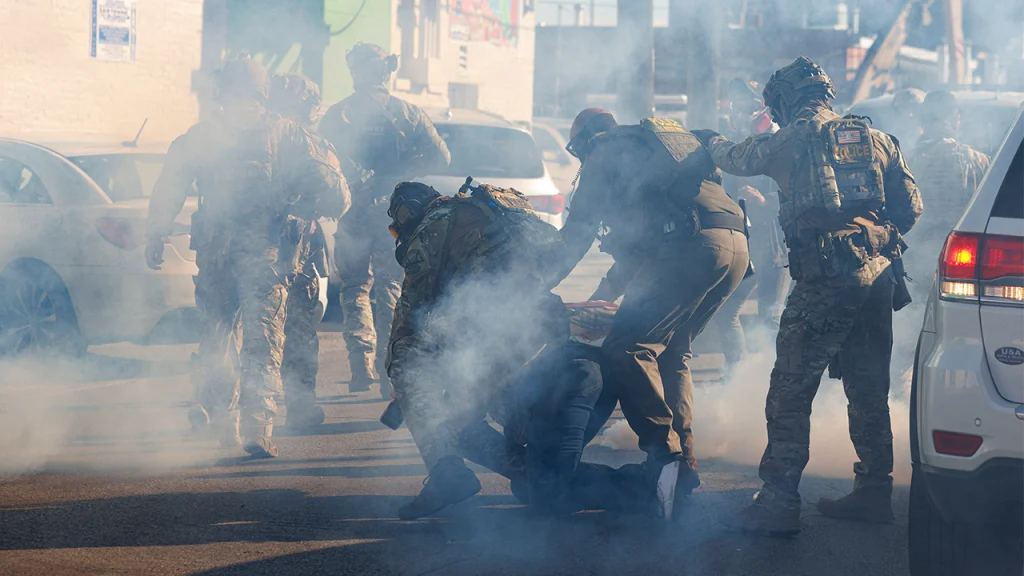Federal Appeals Court Blocks Restrictions on Immigration Enforcement
A federal appeals court has stepped in to halt a lower court’s order that sought to restrict how immigration agents could use force during operations in the Chicago area. The Seventh Circuit panel decided that U.S. District Judge Sara Ellis’s preliminary injunction was “overbroad” and “too prescriptive,” suggesting that it resembled federal regulation rather than a judicial order. The ruling comes amid ongoing tensions between immigration enforcement agencies and communities where operations are taking place. Judge Ellis had originally imposed the restrictions after hearing testimony from media members and demonstrators who claimed they experienced excessive force during immigration operations that have resulted in over 3,000 arrests since September across Chicago and surrounding areas.
The contested preliminary injunction had specifically prohibited agents from using physical force and chemical agents like tear gas and pepper balls except when absolutely necessary to prevent “an immediate threat.” In her ruling, Judge Ellis had determined that the use of such tools violated the constitutional rights of journalists and protesters who were present at immigration enforcement operations. Witnesses who testified in the case described disturbing incidents where they were tear-gassed, shot with pepper balls while praying, and had guns pointed at them during enforcement actions. The judge also notably found testimony from Trump administration witnesses, including Border Patrol commander Gregory Bovino who led the Chicago operation, to be “simply not credible.” Bovino, who has since moved to North Carolina, had defended his agents’ use of force throughout the proceedings.
The Justice Department pushed back strongly against the restrictions, arguing that Judge Ellis’s order severely limited law enforcement’s ability to carry out their duties effectively and could potentially “subvert” the constitutional structure. Department lawyers maintained that these limitations would hamper agents’ capacity to enforce immigration laws and maintain security during operations. The appeals court appeared to agree with many of these concerns, though they cautioned against “overreading” their decision to stay the lower court’s order. The panel suggested that a fast-track appeal process could eventually result in a “more tailored and appropriate” order that better balances enforcement needs with constitutional protections, indicating this may not be the final word on the matter.
The Chicago immigration operation has become a flashpoint in the larger national debate about immigration enforcement tactics. It’s not just the excessive force allegations that have drawn scrutiny; the operation has sparked multiple lawsuits, including serious claims about inhumane conditions at federal immigration detention facilities in the area. These allegations were significant enough that they prompted a federal judge and attorneys to personally visit a U.S. Immigration and Customs Enforcement center outside Chicago just last week to assess conditions firsthand. Detainees have reported troubling conditions, with one judge noting that people in custody “shouldn’t be sleeping next to overflowing toilets” – highlighting the broader humanitarian concerns that have accompanied the enforcement operation.
The federal immigration operation in Chicago represents part of a broader strategy that has seen border enforcement officials deployed to interior cities. Under Commander Bovino’s leadership, approximately 230 officers from U.S. Customs and Border Protection were brought to the Chicago region beginning in September. With Bovino now relocated to North Carolina, the operation continues, and similar deployments are expected in other cities, with New Orleans reportedly next on the list. This deployment strategy has raised questions about the appropriate role and tactics of federal border agents when operating in interior communities, especially as concerns about excessive force and detainee treatment continue to emerge across multiple locations.
The Department of Homeland Security has welcomed the appeals court’s decision, with spokeswoman Tricia McLaughlin characterizing the stay as “a win for the rule of law and for the safety of every law enforcement officer.” This statement reflects the agency’s position that the original restrictions would have hampered agents’ ability to protect themselves and effectively carry out their duties. However, the appeals court’s careful language suggesting a more tailored approach might eventually be appropriate indicates that some form of limitations on enforcement tactics may still emerge from the ongoing legal process. The panel’s decision to expedite the appeal process also suggests the courts recognize the importance and urgency of finding the right balance between effective law enforcement and constitutional protections.
The case highlights the ongoing tension between aggressive immigration enforcement policies and concerns about civil liberties and humane treatment. As federal agents continue operations in Chicago and prepare to deploy to other cities, the legal battles surrounding their tactics and the conditions in detention facilities will likely continue. The appeals court’s decision provides temporary relief for immigration enforcement agencies, allowing them to operate with fewer restrictions for now, but the broader questions about appropriate use of force, detention conditions, and the constitutional rights of both undocumented immigrants and U.S. citizens who interact with immigration operations remain unresolved. As this case proceeds through expedited appeal, it may ultimately help establish clearer guidelines for how immigration enforcement can operate within constitutional boundaries.













